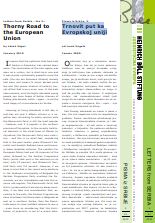

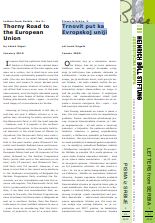
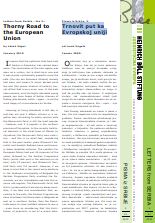
11th Letter from Serbia: A Time of Collective Self-Deception.
Pisma iz Srbije, broj 11: Razdoblje kolektivnog samoobmanjivanja.
More...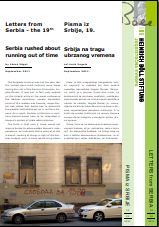
Serbia rushed about running out of time. 19th Letter from Serbia
Pisma iz Srbije, broj 19: Srbija na tragu ubrzanog vremena.
More...
CKP Mission Statement
CKP Küldetésnyilatkozat
Keywords: CKP;Mission Statement (CKP)
The Civil Platform for Public Education (CKP) is a democratic cooperation forum of more than fifty Hungarian civil society organizations operating based on shared educational policies. This document is the mission statement of CKP.
More...
CKP Fundamental values
CKP alapértékek
Keywords: CKP;CKP Fundamental values
This document lists the fundamental values of Civil Platform for Public Education (CKP). CKP is a democratic cooperation forum of more than fifty Hungarian civil society organizations operating based on shared educational policies. Any effectual education policy should be accordant to CKP fundamental values (see text under Add Files tab in Hungarian and English).
More...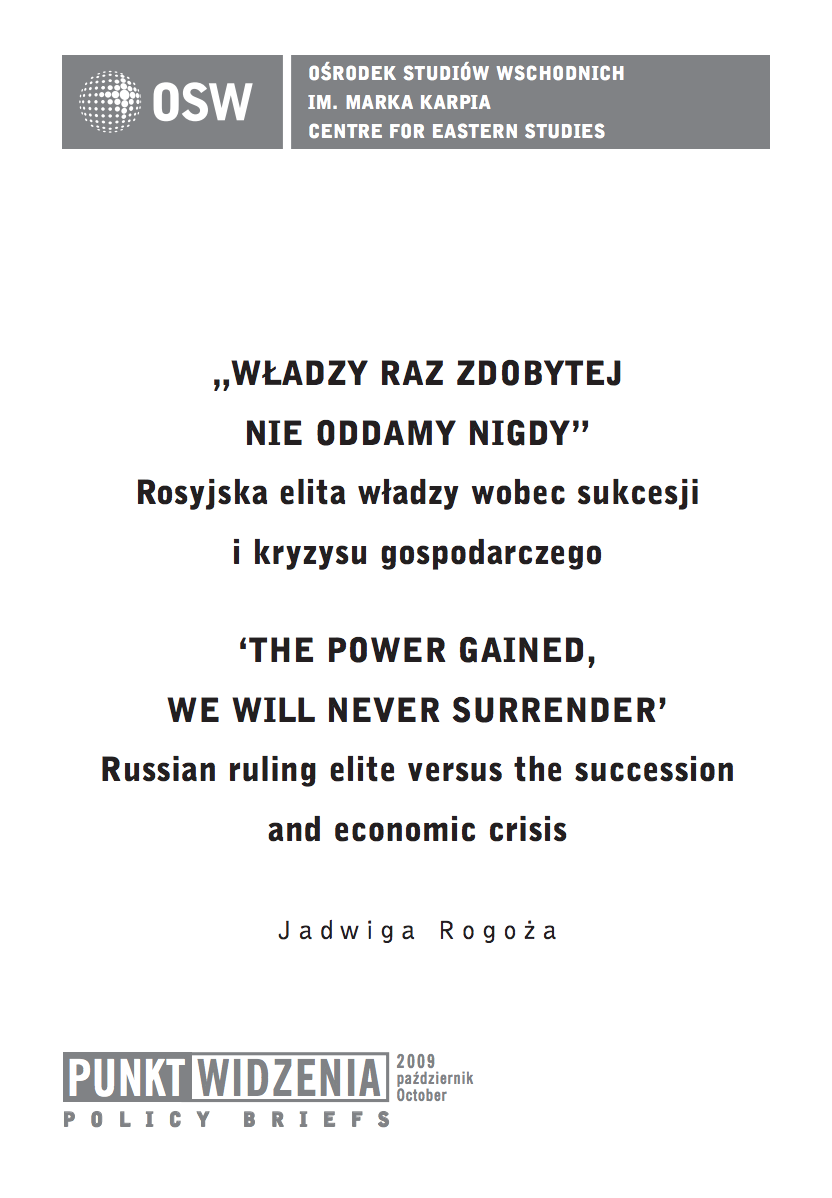
'The power gained, we will never surrender' Russian ruling elite versus the succession and economic crisis
'The power gained, we will never surrender' Russian ruling elite versus the succession and economic crisis
Keywords: Russian ruling elite; governance; corruption
Even though the economic crisis proved harmful to the Russian economy and people's living standards, it has nonetheless failed to make the elite revise its policy. Despite some problems, the government has managed to sustain economic and political stability, thanks to the reserves it amassed in the times of prosperity, and to the propaganda campaign that protected it, above all Vladimir Putin. The crisis failed to force the elite to implement deeper structural and political reforms. Moreover, it has actually reinforced existing tendencies, such as state control over the economy and its oil-oriented character, the elite's economic expansion at the expense of private businesses, and the preservation of political power. Thus, the crisis has so far failed to dismantle Putinism, indeed quite the reverse - it has in fact contributed to its becoming 'set in stone'.
More...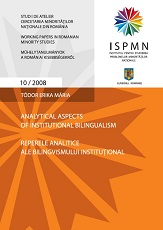
Analytical aspects of institutional bilingualism
Reperele analitice ale bilingvismului instituţional
Keywords: Institutional bilinualism; School structures in Romania; Education policy; School-life practice; Language learning;
The present study deals with institutional bilingualism in the context of school structures in Romania where the language of teaching is different from Romanian. The conclusions of the paper show a few possible directions to follow in the context of conceiving an educational policy in which the linguistic alterity represents a natural element to be taken into consideration when considering the qualitative aspects of organisational structures.
More...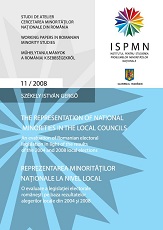
The representation of national minorities in the local councils – an evaluation of Romanian electoral legislation in light of the results of the 2004 and 2008 local elections.
Reprezentarea minorităţilor naţionale la nivel local – O evaluare a legislaţiei electorale româneşti pe baza rezultatelor alegerilor locale din 2004 şi 2008
Keywords: Local councils; national minorities; Romanian electoral legislation; 2004 and 2008 local elections; "small" minorities;
The paper assesses Romanian legislation regarding the representation of national minorities (except the Hungarians) in local councils. Most minorities are still seriously underrepresented in the local decisional fora, despite the existence of a special provision in the electoral law of 2004, that grants some sort of affirmative action for minority organizations. In order to evaluate the utility of this special provision, I re-analyzed the results of the last two local elections, comparing the actual results of the minority organizations to the hypothetical results they would have obtained in the absence of the special rule, that is, if they had been treated alike to the mainstream political parties. This allowed the identification of those cases when the minorities indeed benefited from the affirmative action provided by the law. Unfortunately, the scope of applicability of the special rule proved to be very limited, the minority organizations would have obtained most of their seats also without the application of the special provision. Moreover, the provision may have even adverse effects, as it may prevent some organizations from obtaining seats even if they obtained a number of votes that would have been sufficient for getting represented if they had been treated alike to the political parties. This is due to the logic behind the special provision, which advantages a single minority organization, often to the expense of the others. The net gain of seats due to the regulation is so small that one can conclude that there is no point for retaining the regulation in its present shape. The minorities have realized this too, and they initiated a bill in order to replace the current system with something very similar to the regulations in force at the level of the Chamber of Deputies. The paper briefly assesses this proposal too, however, the conclusions are not very optimistic in this regard either.
More...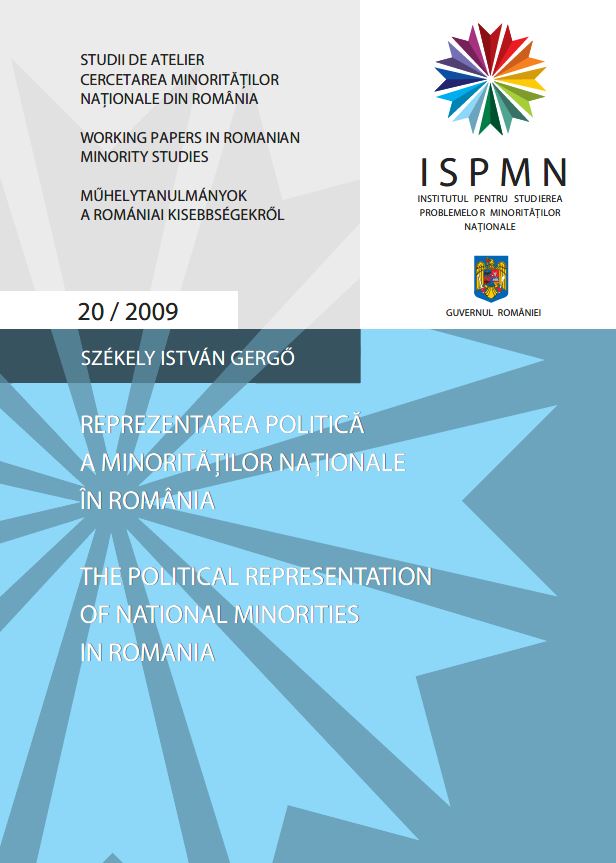
The political Representation of National Minorities in Romania
Reprezentarea politică a minorităţilor naţionale în România
Keywords: National minorities in Romania; Representation; Participation of minorities in election process; Discriminatory nature of the candidature conditions;
The paper consists of two main parts. The first part reviews the evolution of the most important aspects of Romanian electoral legislation concerning the representation of national minorities, both at the national and the local level. The second part presents the results obtained by the organizations of 19 minorities from Romania at the national elections (1990-2008) and the elections to the local and county councils (1996-2008). During the two decades that passed since the fall of Communism, Romanian electoral legislation underwent multiple changes, with both positive and negative consequences on the participation of minorities. Among the negative changes we have to mention the introduction (and subsequent raising) of electoral thresholds, and the adoption of double standards regarding candidatures for organizations represented in Parliament and those outside Parliament (obviously, with way more difficult conditions for the latter category). The higher thresholds introduced after 2000 had a negative impact on the number of minority representatives in the local councils, and with the exception of Hungarians and Germans, the minorities disappeared from the county councils. The double standards regarding candidature considerably watered down political competition within the minority communities, almost to the extent of granting political monopoly for the organizations in Parliament over the communities they claim to represent. On the other hand, Romanian electoral laws also contain special rules that provide electoral affirmative action for minorities. In the Chamber of Deputies the presence of minorities is almost guaranteed, due to the existence of special seats that can be obtained by reaching a symbolic alternative threshold. Affirmative action is present at the level of the local councils too, but it is far from being efficient. On the contrary, the special rule at the local level is ill-conceived: it is unable to counteract the underrepresentation of minorities, moreover, it can even deprive them of some seats they would have obtained, had they been treated like the political parties. Taking into account the underrepresentation of minorities (and the negative trend concerning this), the discriminatory nature of the candidature conditions and the inefficiency of the special electoral rule, the conclusions of the study call for a thorough redesign of the Romanian system of minority representation.
More...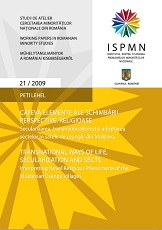
Transnational Ways of Life, Secularization and Sects. Interpreting Novel Religious Phenomena of the Moldavian Csángó Villages
Câteva elemente ale schimbării perspectivei religioase: secularizarea, transnaţionalismul şi adoptarea sectelor în satele de ceangăi din Moldova
Keywords: Transnational Ways of Life; Secularization; Religious Phenomena; Moldova; Csángó Villages; Tradition;
The paper aims to describe phenomena of modernization in Moldavian Csango villages in the context of religiosity. It interprets the most significant shifts in the life forms and traditional religiosity, the change of central values, tendencies of secularization and the emergence of sectarianism. The author argues that the religious experience gradually evades community and (Church) legitimation, so that the ever-larger individualization of religious experiences and conceptualization leads to the pluralization of worldviews. The impersonalization of social control, the changing norms that affect everyday life, the role change of religious values, the individualization of communities, basically the transforming forces of modernization on society disable the catholic church to fully integrate the Csango village population, who in rising numbers attend new teachings that offer an updated worldview, as well as a brand new set of community/religious norms. The author argues, that sectarianism/sectarianization is a part of modernizational strategies, and that as a consequence of transnational life forms, sects have become part of social mobility.
More...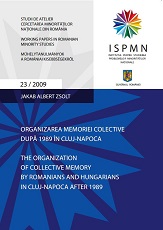
The Organization of Collective Memory by Romanians and Hungarians in Cluj-Napoca after 1989
Organizarea memoriei colective după 1989 în Cluj-Napoca.
Keywords: Cluj-Napoca; Post-1989; Collective memory of Romanians; Hungarians; 1848-1849 Revolution War of Independence; Romanian National Unity;
Transylvania, annexed to Romania in 1920, is a place of continuous Romanian-Hungarian conflicts. There is always a domain of conflict between the Hungarian minority and the Romanian majority represented by the construction, the invention and commemorative use of the past. In my ethnographic and socio-anthropologic analysis I focus on the "memory entrepreneurism", and foreground those interethnic relations and symbolic behaviours that stand behind it in the social context of the multiethnic Cluj-Napoca. The change of regime of 1989 brought along not only a political closure, but also one with on the framework of the imagined past. On the social level this resulted in the drama of the diminuation of belief in the institutions and authorities. The past constructed up to that point naturally lost its political legitimacy. There were two kinds of attitudes emerging within the self-legitimating strategies regarding the past. On the one hand the denial of continuity, the rejection of the past constructed by previous societies in the interest of the new historical order. This new historical order didn't wish to continue the previous economical, social and political relations. But on the other hand, in there was a rising need for historical depth: how can one legitimate the present and create a continuity in the historical space? Nevertheless, the new system considered it necessary to deduce the new social order from history. It had a need for the past also because it defined itself against the past, distancing itself from it: thus the past became surpassed and at the same time an example to follow. The period between 1989 and 2008 proved to be one of the most productive regarding the local construction of memory. Therefore my paper analyses the tendencies of post-1989 past construction. What previously exposed component of the past was made invisible by the new system? What was overtaken and what kind of new components were brought to the surface? What kind of conflicts were revealed, what kind of identity strategies, legitimating processes and national discourses were put into motion by the construction of the (new) memory?
More...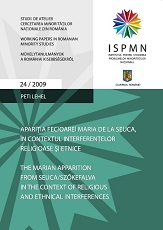
The Marian Apparition from Seuca/Szőkefalva in the Context of Religious and Ethnical Interferences
Apariţia Fecioarei Maria de la Seuca, în contextul interferenţelor religioase şi entice.
Keywords: The Marian Apparition; Seuca/Szőkefalva; Religious and Ethnical Interferences; Inter-ethnic and Denominational co-existence;
Situated on the border of Latin and Orthodox Christianity, in a region where the infrastructural and the economical possibilities were limited, the Romanian village Seuca became an internationally known place for pilgrimage due to a blind Gypsy women's public visions about Virgin Mary in the first years of the new millennium. The author presents both the history of the ethnical and confessional co-existence in the village and the economical and social problems which affected the whole community. Then, the attitudes towards the apparition of the different denominations will be highlighted by presenting also the way the seer attempts to question the different denominational opinions. The legitimating strategies of a gypsy woman influenced very much the aspects of Virgin Mary vision from Seuca.
More...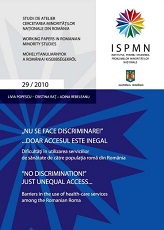
„No discrimination!” Just unequal access… Barriers in the use of health-care services among the Romanian Roma
„Nu se face discriminare!” ...doar accesul este inegal. Dificultăţi în utilizarea serviciilor de sănătate de către populaţia romă din România
Keywords: Health-care services; Romanian Roma; Discrimination; Health status; Public health care;
The paper investigates the barriers in the access to health-care services embedded in the configuration of welfare rights and the insurance-based health care system, comparing the situation of Romanians, Hungarians and Roma in the North-West Development Region of Romania. It argues that the inconsistencies of welfare regulations allow the perpetuation of the structural disadvantage of the Roma, despite of the government's declared commitment to fight Roma discrimination and promote social inclusion, as stated in the national strategies of 2002 and 2006, and reaffirmed through the participation in the Decade of Roma Inclusion 2005-2015.
More...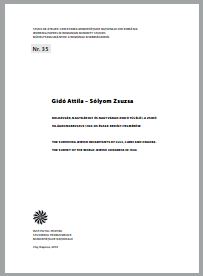
The surviving Jewish inhabitants of Cluj, Carei and Oradea. The survey of the World Jewish Congress in 1946
Kolozsvár, Nagykároly és Nagyvárad zsidó túlélői. A Zsidó Világkongresszus 1946-os észak-erdélyi felmérése
Keywords: World Jewish Congress; 1946; Holocaust period; Jewish survivors;
The Romanian Section of the World Jewish Congress (henceforth: WJC) conducted a national survey among the Jewish survivors of the Holocaust in 1946. The objective of the survey was to assess the human and material losses and record the grievances suffered by the surviving Jewish population. In addition to this the statistical data gathered was intended to serve as a basis during the negotiations of the Peace conference ending World War II and for compensation claim. This study analyses the survey and its results regarding three towns from Northern Transylvania (Cluj, Carei and Oradea) which belonged to Hungary during the Holocaust period.
More...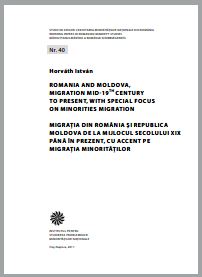
Romania and Moldova, Migration mid-19th Century to Present, with Special Focus on Minorities Migration
Migraţia din România şi Republica Moldova de la mijlocul secolului XIX până în prezent, cu accent pe migraţia minorităţilor
Keywords: Migration studies; Romania-Moldova; 19th-century - present days; Ethnic minorities; Mass migrations;
The purpose of the article is to review those main migratory fluxes from the present-day territories of Romania and Republic of Moldova which occurred in the modern period. The first version of the article was written for a universal encyclopedia of international migration history; as such, although they might sound redundant for the Romanian readers, using certain phrases was necessary for a wider audience that knows little about the region. The length at which the main migrational flows have been dealt with takes into account neither the number of migrants nor the demographic or other consequences (thus migration from recent decades is only summarily treated). Rather, the author offers a review of the circumstances which have caused the migratory flows and presents the most important estimates on the demographic effects of each major migratory stream. Sketching these constitutes a starting point for the migration history of the region but it shouldn't be considered as an in-depth analysis.
More...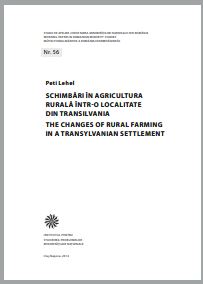
The changes of rural farming in a Transylvanian settlement
Schimbări în agricultura rurală într-o localitate din Transilvania
Keywords: Rural farming; Transylvanian settlement; Pluriactivity and diversification; Agricultural activities; Small farms; Sheep farms;
The article analyzes the changes occurred in a Transylvanian village farming. First part of the paper focuses on the economic and social frameworks and context of the rural farming. The main part of the analysis based on the theoretical concepts of pluriactivity, diversification and food self-provisioning and the conceptualization of the special literature analyzes the economic strategies of a Romanian village, seeking to present a typology based on nature of economic strategies. The author argues that the main strategy is pluriactivity, however the limited forms of diversification are also present in the farming patterns of the village, which mark a shift toward a more specialized, profit-oriented farming. Near this strategies the food self-provisioning is also present, what is more there has appeared new ideologies and meanings regarding to food very well known mostly from the western countries' alternative food networks.
More...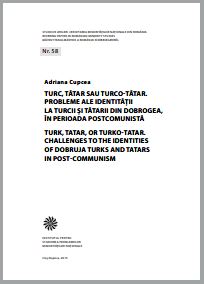
Subsistence strategies in a settlement situated along the Kis-Küküllő (Târnava Mică) Rive
Strategii de subzistenţă într-o localitate de lângă Târnava Mică
Keywords: Subsistence strategies; Economic and social changes; social stratifications; Farms; Horticultures; Day-labourers; Quasi-agricultural enterprise experiments;
The study attempts to present the economic strategies of a settlement, in which employment in state companies built upon a specific environmental resource (natural gas extraction) as well as the success of an independent enterprise has significantly transformed the livelihood strategies based on agriculture, resulting in a change in lifestyle as well. The studied settlement represents the opposite model of the villages re-peasantised after the regime change, described in the Transylvanian scholarly literature. The study analyses the economic behaviour modes, as well as the changes in the livelihood strategies observed in a settlement along the Kis-Küküllő (Târnava Mică) River, aiming to present the stratification of the rural society based on economic strategies. The author outlines the way in which in this multiethnic (inhabited by Hungarians, Romanians and Romani) small settlement, the bakery which used to function as a cooperative during socialism became a well-established company employing a significant part of the village's population, being present in important segments of the national markets, connecting the previously isolated small settlement with new regional and national networks. He also presents the significance of the natural gas extraction activities from the point of view of livelihood strategies, after which he presents the economic strategies built upon agricultural activities.
More...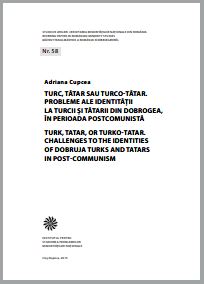
Turk, Tatar, Or Turko-Tatar. Challenges to the Identities of Dobruja Turks and Tatars in Post-communism
Turc, tătar sau turco-tătar. Probleme ale identității la turcii și tătarii din Dobrogea, în perioada postcomunistă
Keywords: Turk-Tatar identities; Post-communism period; ethnic community; cultural orientation; Identity overlapping;
This research aims to analyze the use and the references to the terms of Turkish, Tatar or Turkish-Tatar, as a reflection of the argumentative discourse, set up after 1990 in order to legitimize the options for a single ethnic identity, either Turkish or Tartar, or for a double ethnic identity, Turkish-Tatar. At the same time, the research shows the chronological alternation of these options from the level of the official discourse until the community level, identifying the social, political, economic, cultural or symbolic factors that determined this sequence in the post-communist era. From the methodological point of view, the research is based on the semantic analysis applied on the texts published in the newspapers of the Turkish and Tatar communities, Hakses (The Authentic Voice) and Karadeniz (The Black Sea). In the same time I used a series of documents issued by the representative organizations of the two ethnic groups, some published, some original unpublished documents. Finally, the research is based on a large number of semi-structured interviews with members of the two communities, conducted during successive field campaigns initiated in early 2013, the debate over a Turkish, Tatar or Turkish-Tatar identity being a recurring topic, self-discovered to the researcher in the field.
More...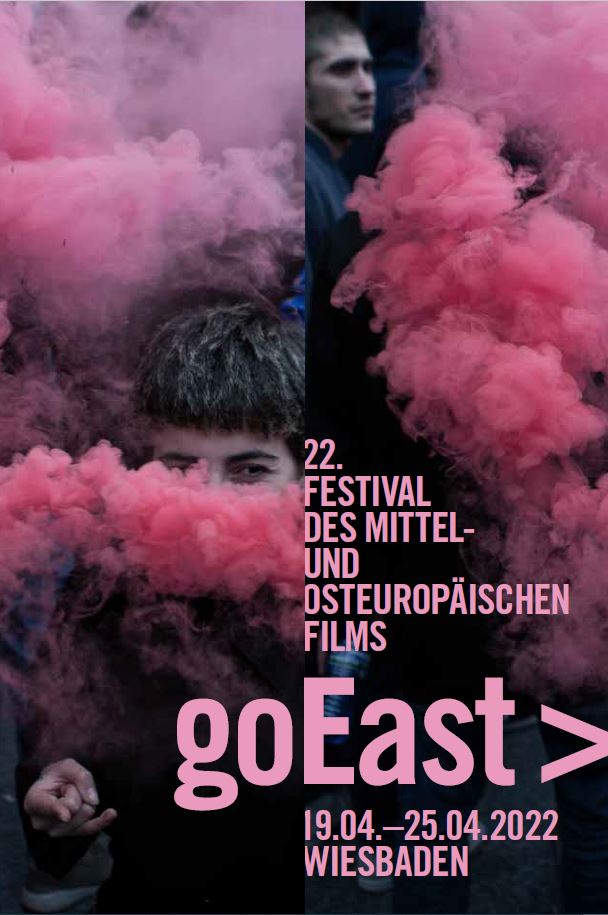
goEast - 22nd Festival of Central and Eastern European Film
goEast - 22. Festival des mittel- und osteueropäischen Films
Keywords: festival;film;cinema;catalogue
More...The search is temporarily unavailable.
We apologize in advance for the inconvenience and thank you for your kind understanding.
